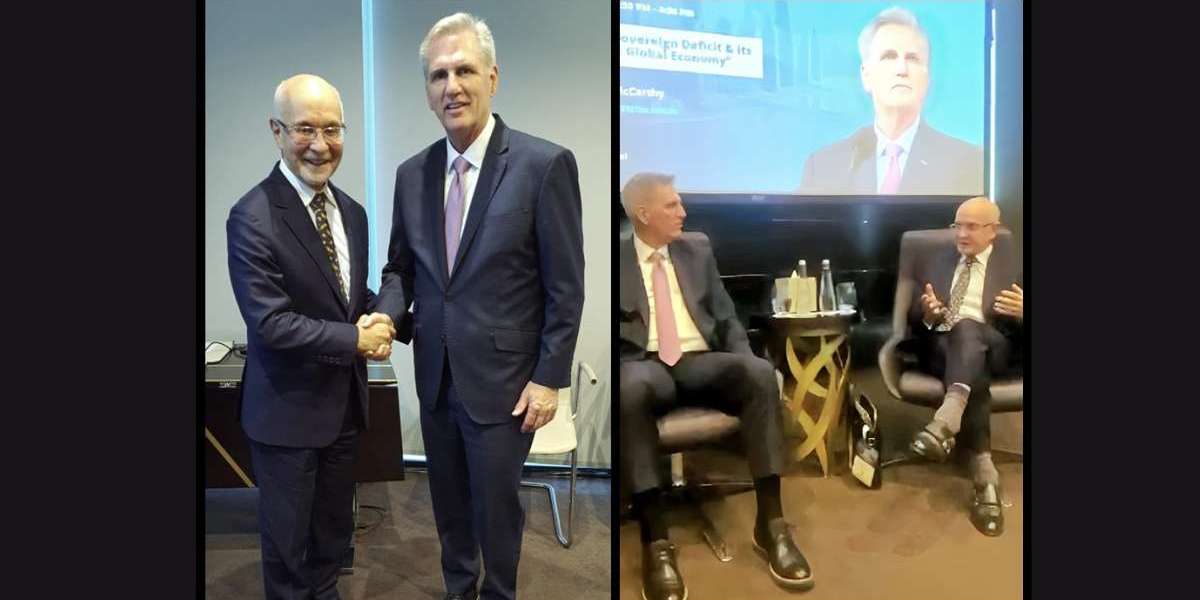Kevin McCarthy's Address at AIM Summit Dubai: A Deep Dive into Global Economic Challenges
At the recent AIM Summit Dubai, Kevin McCarthy, the 55th Speaker of the US House of Representatives, engaged in a thought-provoking discussion on pressing global economic issues. His dialogue with David Gibson-Moore shed light on the escalating global sovereign debt crisis, the intensifying political polarization in Western democracies, and the emerging concept of the EM-ification of the US economy.
Global Sovereign Debt Crisis: An Urgent Concern
During the summit, McCarthy emphasized the alarming trajectory of national debts worldwide. He highlighted that many developed nations are grappling with debt levels that pose significant threats to economic stability. The burgeoning debt burdens not only strain national economies but also have far-reaching implications for global financial markets.
"Unchecked sovereign debt is a ticking time bomb for the global economy," McCarthy remarked.
This sentiment underscores the necessity for nations to adopt prudent fiscal policies to avert potential economic downturns.
The Magnitude of Sovereign Debt
The global sovereign debt has reached unprecedented levels, with many countries experiencing debt-to-GDP ratios exceeding 100%. This scenario is particularly prevalent in developed economies, where borrowing has surged to finance public spending, especially in response to recent crises such as the COVID-19 pandemic. The International Monetary Fund (IMF) has repeatedly warned about the sustainability of such debt levels and the potential for triggering financial crises if not managed effectively.
Implications for Emerging Markets
Emerging markets are not immune to the ripple effects of the sovereign debt crisis in developed nations. High debt levels in advanced economies can lead to tighter global financial conditions, making it more challenging for emerging markets to access affordable financing. Additionally, capital flows may become more volatile, and currency pressures can intensify, further complicating economic management in these countries.
Political Polarization in Western Democracies: A Barrier to Progress
McCarthy also addressed the growing political polarization in Western democracies, noting that deepening divisions hinder effective governance and policy-making. This polarization exacerbates challenges in addressing critical issues like the sovereign debt crisis, as consensus becomes increasingly elusive.
"Bridging political divides is essential for enacting meaningful economic reforms," he asserted.
The call for unity and cross-party collaboration resonates as a vital step toward sustainable solutions.
Causes of Political Polarization
Several factors contribute to the rising political polarization in Western democracies:
Media Fragmentation: The proliferation of media outlets, particularly online platforms, has led to information silos where individuals are exposed primarily to viewpoints that reinforce their existing beliefs.
Economic Inequality: Growing disparities in wealth and income can fuel resentment and division, leading to the emergence of populist movements and extremist ideologies.
Cultural and Social Divides: Issues related to immigration, race, and national identity have become flashpoints, further entrenching divisions within societies.
Consequences for Economic Policy
The inability to achieve bipartisan consensus has tangible economic repercussions:
Delayed Reforms: Essential economic reforms, such as tax restructuring or entitlement adjustments, may be postponed or abandoned due to political gridlock.
Market Uncertainty: Persistent political instability can erode investor confidence, leading to increased market volatility and reduced foreign direct investment.
Erosion of Institutions: Continuous polarization can weaken public trust in institutions, undermining their effectiveness and legitimacy.
EM-ification of the US Economy: Drawing Parallels with Emerging Markets
A particularly compelling point in McCarthy's discourse was the concept of the EM-ification of the US economy. He drew parallels between current economic trends in the United States and characteristics typically associated with emerging markets, such as political instability and weakened institutions.
"Recognizing and addressing these emerging market-like trends is crucial for maintaining economic resilience," McCarthy warned.
This observation serves as a cautionary note for policymakers to reinforce institutional frameworks and ensure economic stability.
Characteristics of EM-ification
The term "EM-ification" refers to the process by which an advanced economy begins to exhibit features commonly associated with emerging markets, including:
Fiscal Instability: High and rising public debt levels leading to concerns about fiscal sustainability.
Political Uncertainty: Increased political polarization and dysfunction affecting policy continuity and effectiveness.
Institutional Weaknesses: Erosion of institutional checks and balances, leading to diminished governance quality.
Market Volatility: Greater susceptibility to market fluctuations and external shocks.
Implications for the US Economy
The emergence of these characteristics in the US context could have several implications:
Credit Rating Downgrades: Perceived fiscal and political instability could lead to downgrades by credit rating agencies, increasing borrowing costs.
Investment Flight: Investors may seek more stable environments, leading to capital outflows and reduced investment in critical sectors.
Currency Depreciation: Loss of confidence could result in a weaker dollar, impacting import prices and contributing to inflationary pressures.
Conclusion
Kevin McCarthy's insights at the AIM Summit Dubai provided a comprehensive analysis of the intertwined challenges facing the global economy. Addressing the sovereign debt crisis, mitigating political polarization, and acknowledging emerging economic patterns are imperative for fostering a stable and prosperous global financial environment.
The discussions underscore the need for proactive policy measures, cross-party collaboration, and vigilant monitoring of economic indicators to navigate the complexities of the current economic landscape. As nations grapple with these challenges, the emphasis must be on sustainable solutions that promote long-term stability and growth.








